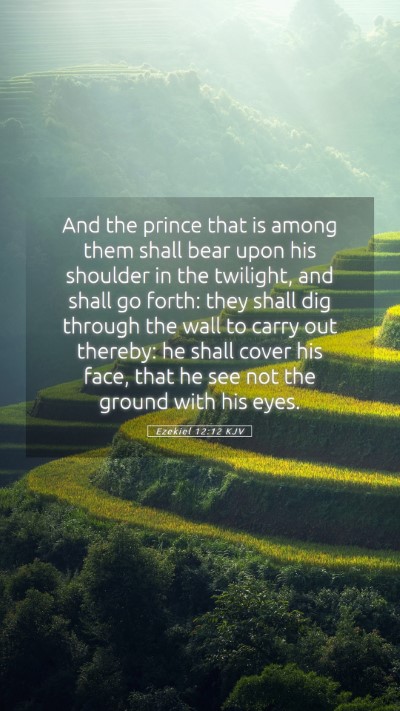Understanding Ezekiel 12:12 - A Scriptural Analysis
Ezekiel 12:12 states: "And the prince that is among them shall bear upon his shoulder in the twilight, and shall go forth: they shall dig through the wall to carry out thereby: he shall cover his face, that he see not the ground with his eyes." This verse provides significant insights into themes of prophecy, leadership, and the consequences of Israel's disobedience.
Verse Breakdown and Commentary
This verse is rich in metaphor and symbolism. Below is a detailed examination of its components drawn from various public domain commentaries:
- The Prince's Role: The term "prince" here is often interpreted as a leader, possibly referring to Zedekiah, the last king of Judah. This commentary drives home the idea that the leaders bear considerable responsibility for the actions of their people (Albert Barnes).
- Actions in Twilight: The imagery of the "twilight" signifies a time of transition and uncertainty, symbolizing the sordid downfall of Israel under siege and impending destruction (Matthew Henry).
- Carrying Out by Digging: The act of digging through the wall portrays the desperate measures taken by the prince to escape. It symbolizes the effort to evade judgment, which highlights a lack of trust in God's protection (Adam Clarke).
- Covering the Face: Covering one's face not only indicates shame but also reflects a sense of foreboding, symbolizing despair and the resultant consequences of sin (Matthew Henry).
- Seeing Not the Ground: The inability to see the ground symbolizes denial of reality—how leaders often ignore the dire circumstances due to their actions, reflecting blind leadership in crisis (Albert Barnes).
Theological Implications
The theological implications of Ezekiel 12:12 delve into God's plans for judgment, the consequences of leadership decisions, and the broader narrative of divine retribution against Israel's unfaithfulness.
In this context, the commentary points out that the actions of the prince and the escape depict Israel's spiritual blindness and futility in trying to evade God's judgment. They serve as a warning to leaders about the significance of their choices and the impacts they have on their communities (Adam Clarke).
Why This Verse Matters
This verse is crucial not only for its prophetic elements but also for the lessons it teaches about leadership accountability and the seriousness of sin. It serves as a reminder that evading accountability can lead to dire consequences, relevant for both individual and communal faith practices.
Application in Daily Life
The essence of Ezekiel 12:12 can be applied practically in various areas of life:
- Leadership Roles: Reflecting on how one leads, reminding that those in positions of authority should act wisely and bear the burdens of their decisions.
- Community Awareness: Understanding the importance of remaining attentive to the spiritual and practical needs of one's community.
- Personal Reflection: Encouraging personal accountability and awareness of one's actions, leading to a greater understanding of God’s expectations.
Cross References
This verse relates closely to several other biblical passages:
- Jeremiah 39:4-7: Relates to the capture of Zedekiah and the consequences of disobedience.
- Ezekiel 33:1-9: Enforces the idea of a watchman and the responsibility of leaders to guide their people.
- Isaiah 22:1-14: Discusses the consequences faced by the leaders of Jerusalem during a time of crisis.
Conclusion
In conclusion, Ezekiel 12:12 serves as a powerful reminder of the significance of spiritual leadership, the dire consequences of choices made under God's judgment, and the importance of being vigilant and accountable in our personal lives and communities. It urges us to reflect deeply on our perceptions of leadership and our responses to God's word.
By integrating these observations, we gain a richer understanding of Scripture, enhancing our Bible study insights and encouraging collective exploration within Bible study groups.


